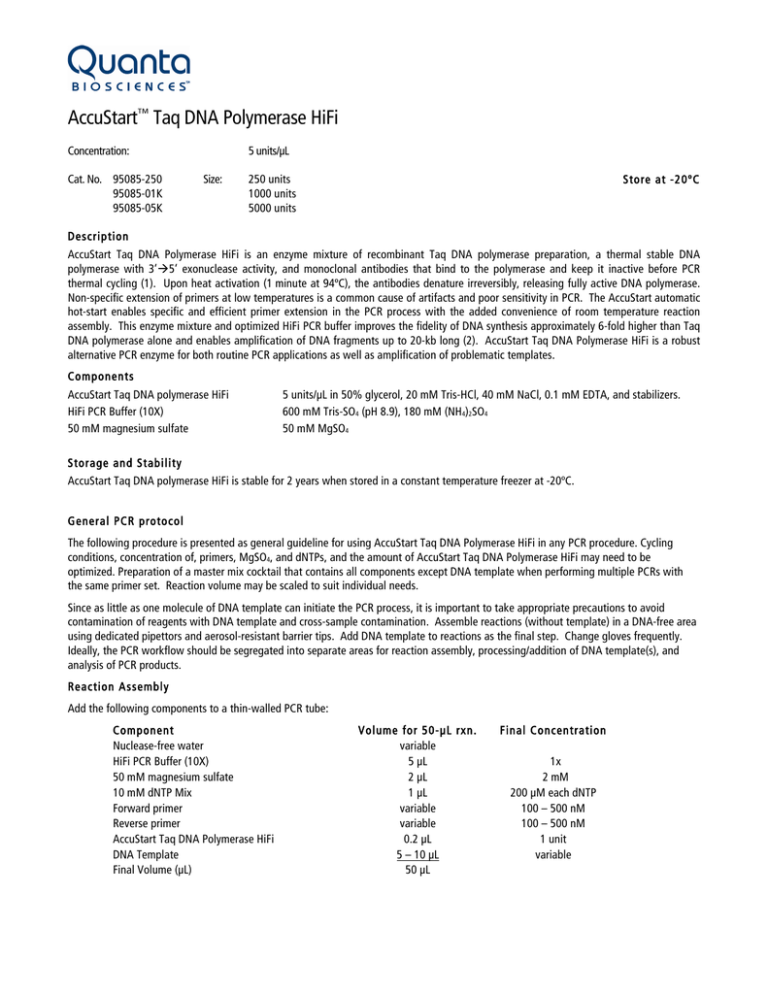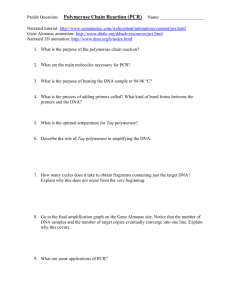
AccuStart™ Taq DNA Polymerase HiFi
Concentration:
Cat. No. 95085-250
95085-01K
95085-05K
5 units/µL
Size:
250 units
1000 units
5000 units
Store at -20ºC
Description
AccuStart Taq DNA Polymerase HiFi is an enzyme mixture of recombinant Taq DNA polymerase preparation, a thermal stable DNA
polymerase with 3’à5’ exonuclease activity, and monoclonal antibodies that bind to the polymerase and keep it inactive before PCR
thermal cycling (1). Upon heat activation (1 minute at 94ºC), the antibodies denature irreversibly, releasing fully active DNA polymerase.
Non-specific extension of primers at low temperatures is a common cause of artifacts and poor sensitivity in PCR. The AccuStart automatic
hot-start enables specific and efficient primer extension in the PCR process with the added convenience of room temperature reaction
assembly. This enzyme mixture and optimized HiFi PCR buffer improves the fidelity of DNA synthesis approximately 6-fold higher than Taq
DNA polymerase alone and enables amplification of DNA fragments up to 20-kb long (2). AccuStart Taq DNA Polymerase HiFi is a robust
alternative PCR enzyme for both routine PCR applications as well as amplification of problematic templates.
Components
AccuStart Taq DNA polymerase HiFi
HiFi PCR Buffer (10X)
50 mM magnesium sulfate
5 units/µL in 50% glycerol, 20 mM Tris-HCl, 40 mM NaCl, 0.1 mM EDTA, and stabilizers.
600 mM Tris-SO4 (pH 8.9), 180 mM (NH4)2SO4
50 mM MgSO4
Storage and Stability
AccuStart Taq DNA polymerase HiFi is stable for 2 years when stored in a constant temperature freezer at -20ºC.
General PCR protocol
The following procedure is presented as general guideline for using AccuStart Taq DNA Polymerase HiFi in any PCR procedure. Cycling
conditions, concentration of, primers, MgSO4, and dNTPs, and the amount of AccuStart Taq DNA Polymerase HiFi may need to be
optimized. Preparation of a master mix cocktail that contains all components except DNA template when performing multiple PCRs with
the same primer set. Reaction volume may be scaled to suit individual needs.
Since as little as one molecule of DNA template can initiate the PCR process, it is important to take appropriate precautions to avoid
contamination of reagents with DNA template and cross-sample contamination. Assemble reactions (without template) in a DNA-free area
using dedicated pipettors and aerosol-resistant barrier tips. Add DNA template to reactions as the final step. Change gloves frequently.
Ideally, the PCR workflow should be segregated into separate areas for reaction assembly, processing/addition of DNA template(s), and
analysis of PCR products.
Reaction Assembly
Add the following components to a thin-walled PCR tube:
Component
Nuclease-free water
HiFi PCR Buffer (10X)
50 mM magnesium sulfate
10 mM dNTP Mix
Forward primer
Reverse primer
AccuStart Taq DNA Polymerase HiFi
DNA Template
Final Volume (μL)
Volume for 50-μL rxn.
variable
5 µL
2 µL
1 µL
variable
variable
0.2 µL
5 – 10 µL
50 µL
Final Concentration
1x
2 mM
200 µM each dNTP
100 – 500 nM
100 – 500 nM
1 unit
variable
Temperature Cycling Protocol
Incubate the completed reaction mix in thermal cycler as follows:
Initial denaturation:
PCR cycling (20 – 40 cycles:)
Hold
94ºC, 1 min
94ºC, 15 to 20 s
55 – 65ºC, 30s
68ºC, 1 min per kb of product length
4ºC until processed for analysis
Full activation of AccuStart Taq DNA Polymerase HiFi occurs within 30 seconds at 94ºC; however, complete denaturation of doublestranded DNA template is required to initiate the PCR process. Consequently, the initial denaturation time may require optimization
depending on the nature and properties of a given target sequence. A 1-minute initial denaturation is sufficient for amplification of most
templates. Amplification supercoiled DNA templates may require a longer initial denaturation time to fully denature the template prior to
PCR cycling. Initial denature times should be kept to a minimum when amplifying long fragments to avoid temperature induced DNA
damage (deamination, depurination, and strand cleavage).
Quality Control
Kit components are free of contaminating DNase and RNase. AccuStart Taq DNA Polymerase HiFi is functionally tested for amplification of
a 20-kb fragment from human genomic DNA. Inhibition of polymerase activity by the AccuStart anti-Taq monoclonal antibodies is tested in
an activity assay that measures polymerase inhibition relative to an uninhibited control.
Unit definition
One unit is defined as the amount of enzyme that will incorporate 10 nmol of dNTP into acid-insoluble material in 30 minutes at 74°C.
References
1
2
Sharkey, D.J., Scalice, E.R., Christy, K.G., Atwood, S.M., Daiss, J.L. (1994) BioTechnology, 12
Barnes, W.M. (1994) Proc. Natl. Acad. Sci. USA 91, 2216.
Limited Label Licenses
Use of this product is covered by one or more of the following US patents and corresponding patent claims outside the US: 5,789,224, 5,618,711, 6,127,155 and claims outside the US
corresponding to expired US Patent No. 5,079,352. The purchase of this product includes a limited, non-transferable immunity from suit under the foregoing patent claims for using only this
amount of product for the purchaser's own internal research. No right under any other patent claim, no right to perform any patented method, and no right to perform commercial services of
any kind, including without limitation reporting the results of purchaser's activities for a fee or other commercial consideration, is conveyed expressly, by implication, or by estoppel. This
product is for research use only. Diagnostic uses under Roche patents require a separate license from Roche. Further information on purchasing licenses may be obtained by contacting the
Director of Licensing, Applied Biosystems, 850 Lincoln Centre Drive, Foster City, California 94404, USA.
Licensed to Quanta BioSciences, under U.S. Patent Nos. 5,338,671, 5,587,287, and foreign equivalents for use in research only.
AccuStart is a trademark of Quanta BioSciences Inc.
©2002 - 2008 Quanta BioSciences, Inc. All rights reserved.
For research use only. Not intended for any animal or human therapeutic or diagnostic use.
95805 REV 110322

